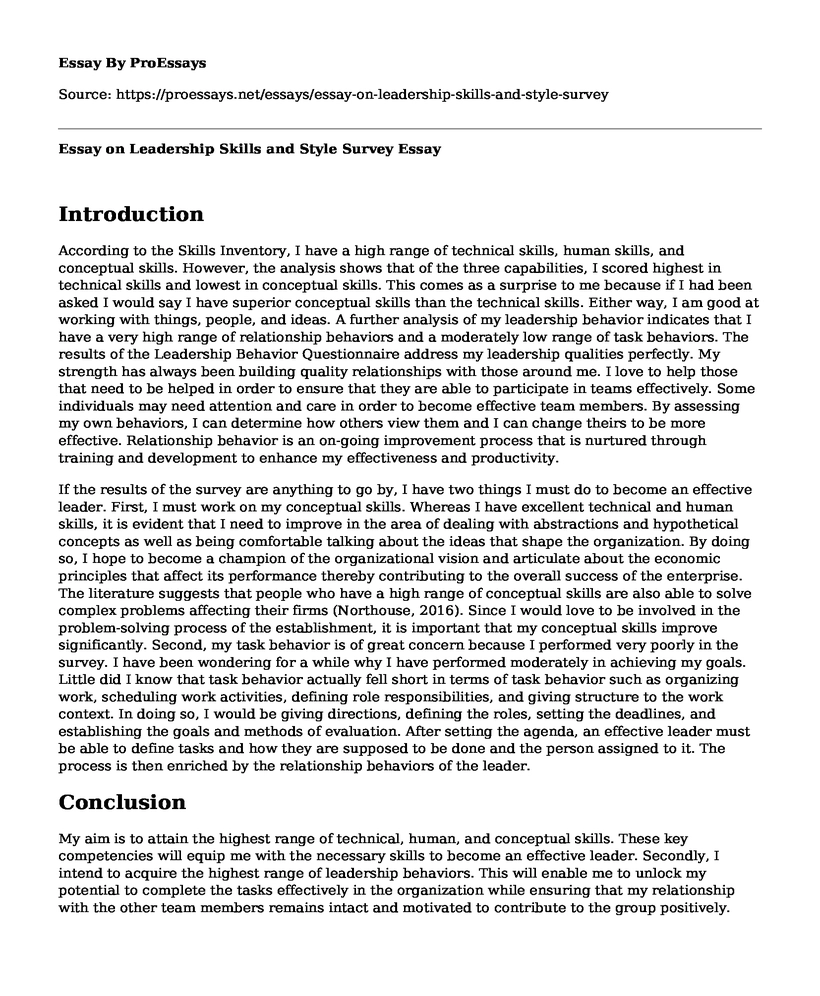Introduction
According to the Skills Inventory, I have a high range of technical skills, human skills, and conceptual skills. However, the analysis shows that of the three capabilities, I scored highest in technical skills and lowest in conceptual skills. This comes as a surprise to me because if I had been asked I would say I have superior conceptual skills than the technical skills. Either way, I am good at working with things, people, and ideas. A further analysis of my leadership behavior indicates that I have a very high range of relationship behaviors and a moderately low range of task behaviors. The results of the Leadership Behavior Questionnaire address my leadership qualities perfectly. My strength has always been building quality relationships with those around me. I love to help those that need to be helped in order to ensure that they are able to participate in teams effectively. Some individuals may need attention and care in order to become effective team members. By assessing my own behaviors, I can determine how others view them and I can change theirs to be more effective. Relationship behavior is an on-going improvement process that is nurtured through training and development to enhance my effectiveness and productivity.
If the results of the survey are anything to go by, I have two things I must do to become an effective leader. First, I must work on my conceptual skills. Whereas I have excellent technical and human skills, it is evident that I need to improve in the area of dealing with abstractions and hypothetical concepts as well as being comfortable talking about the ideas that shape the organization. By doing so, I hope to become a champion of the organizational vision and articulate about the economic principles that affect its performance thereby contributing to the overall success of the enterprise. The literature suggests that people who have a high range of conceptual skills are also able to solve complex problems affecting their firms (Northouse, 2016). Since I would love to be involved in the problem-solving process of the establishment, it is important that my conceptual skills improve significantly. Second, my task behavior is of great concern because I performed very poorly in the survey. I have been wondering for a while why I have performed moderately in achieving my goals. Little did I know that task behavior actually fell short in terms of task behavior such as organizing work, scheduling work activities, defining role responsibilities, and giving structure to the work context. In doing so, I would be giving directions, defining the roles, setting the deadlines, and establishing the goals and methods of evaluation. After setting the agenda, an effective leader must be able to define tasks and how they are supposed to be done and the person assigned to it. The process is then enriched by the relationship behaviors of the leader.
Conclusion
My aim is to attain the highest range of technical, human, and conceptual skills. These key competencies will equip me with the necessary skills to become an effective leader. Secondly, I intend to acquire the highest range of leadership behaviors. This will enable me to unlock my potential to complete the tasks effectively in the organization while ensuring that my relationship with the other team members remains intact and motivated to contribute to the group positively.
Reference
Northouse, P.G. (2016). Leadership: Theory and Practice. 7th Ed. SAGE Publications, Inc.
Cite this page
Essay on Leadership Skills and Style Survey. (2022, Jul 25). Retrieved from https://proessays.net/essays/essay-on-leadership-skills-and-style-survey
If you are the original author of this essay and no longer wish to have it published on the ProEssays website, please click below to request its removal:
- Management Essay Example: Effective Change Agents in Organizations
- Essay Sample on Importance of Stakeholders
- Essay Example on Telecommuting: The Impact of Technology on Work Environments
- Essay Sample on Teamwork & Leadership: My Reflection on Group Working
- The Product Review of Canella Cinnamon Cordial Paper Example
- Essay Sample on Leadership, Critical Thinking and Intellectual Courage
- Adapt or Fail: Change is Inevitable for Organizations - Essay Sample







